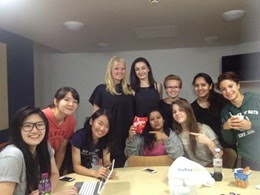The IB World Student Conference
at Bath was woven around the theme “Building a City of the Future”. We had prominent speakers addressing us as a
group each day followed by some focused work in smaller groups (called Group
Action Teams or GAT) to design our “cities of the future”.
There were 90 students from 27
countries gathered for the conference.
We were divided into smaller GAT groups
with one teacher in charge. I was put into GAT group 3, where a teacher from
China, Ms Fanny was the group leader. I was the only Indian in my group, so
there was interesting learning from so many people from different communities.
Our GAT leader had asked us to do some research on a city what was close to us
and asked us to do a presentation on it the next day. I presented on Dubai,
where I discussed its problems, benefits and how it is a sustainable city
today. The main aim of this was to take ideas from different cities and
eventually create a sustainable city of the future for our final conference
project exhibition, covering issues of transport, sustainability and community
aspects.
We had three main guest speakers,
to tell us about their experiences with sustainable cities. The first speaker
we had was Amy Robinson, director of a firm that offers sustainable solutions
in Bristol, a city near Bath. She talked about Bristol, and how it has managed
to become one of the most sustainable cites in UK. The next speaker we had was
Dr. Adumu Idris, who gave his views on the city of Kano, and how it has
segregated over the years. We got a better insight of African cities,
addressing some of the problems helping us for a final project. Finally our
last speaker was Nick Tyler, a Professor of Civil Engineering at the University
College of London. He has international experience in researching and
developing environmentally and socially sustainable solutions for growing
cities. He talked about numerous cities in the world and gave us a broad
insight to urban planning.
In our separate GAT sessions,
there was a lot of interaction with the other people in the conference, which
was really good because I learned a lot about other people’s viewpoints and
thoughts which really enhanced the open mindedness in all of us. We all finally
had to design our own city as a group, with a proper plan and design and
present it on the final day and explain why it was sustainable.
Kumar Rishi Sinha
Grade 12
An IBWS Conference was held in
the outskirts of Bath at the University of Bath on the 27th of July till the
2nd of August 2014. The theme of this conference was ‘The City of the Future’.
Students from across the globe were split up into five groups of around twenty.
These ‘GAT’ groups were then to design their own city. Thought provoking
questions like ‘Is segregation something that needs to be tackled seriously?’
were passed around the groups.
We decided that there were three
main aspects that contributed in making a good city, (1) Transport (2)
Sustainability and (3)
Multiculturalism and Humane living. I decided to be a
part of sustainability as I am passionate about this topic. We discussed what
makes a city sustainable, but we had to consider options we needn’t usually
worry about in this sense-costing and funding. As we made plans, all three
subgroups realized one thing: Whether we wanted to admit it or not, we were
creating a Utopia. Not only is using infinite resources as a source of energy
too expensive to build and manage, so is creating a society where there are no
emissions of green-house gases and no pollution whatsoever looked impossible.
This was not the outcome we were
expecting. We realized that the change that the world needs would be, that we
cut down carbon emissions and eliminate the use of plastics and cars, because
it is more realistic than creating a new world with solar paneled roads (too
expensive!). The “change” this world needs is not something physical, but
something earnable: Respect. Respect for people and our planet.
This course changed my vision of
the future, from something solely materialistic to spiritual. We were given a
tremendous opportunity to partake in a simulation activity in the setting of
the slums, where we had to create handmade paper bags under artificially
created difficult conditions and sell them to the shop keepers. And although
the representation cannot even help us completely comprehend the pain and the
suffering that these families go through, we did end up a little more empathic
and realized the hardships real people go through. The experience and the learning will stay
with me for a long time.
All in all, the experience of
being a part of an IBWSC is like no other. The happiness of meeting new people and
understanding new cultures is incomparable. We felt at home, responsible and
followed the IB learner profile into bettering ourselves as students and people
of this world as we strive to create a positive future for us and the
generations to come.
Simran Bhan
Grade 12


